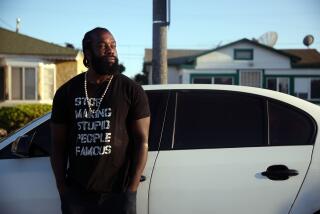Different Neighborhoods, Differing Views on Police Abuse : Southwest L.A.: Most residents said they had relatives who had been either ill-treated physically or verbally by officers, or said they had seen such behavior on the street.
Eddie Harris has lived on a quiet stretch of 11th Avenue in Southwest Los Angeles for nearly three decades, and he can remember only one unpleasant personal encounter with members of the Los Angeles Police Department. It was during a traffic stop years ago as he was driving to work.
“They told me I would have run through a stop sign if they hadn’t been there,” the now-retired department store supervisor said during an interview in his driveway. “They ran a check on me and held me up for 25 minutes. It was ridiculous and totally unnecessary.” Harris said he did not know if the officers stopped him because he is African-American or because he was in a black neighborhood, but he does know one thing:
“I go out of my way to avoid the police. I read the paper. I know what’s going on. I make it my business to avoid them in any way, form or fashion. If you try to explain something to them, this is where they step in and become abusive.”
Harris, like his neighbors on his palm-lined block in the southern edge of the mostly black, mostly middle-class Crenshaw District, agreed with the Christopher Commission that there are a “significant” number of Los Angeles police officers who hold negative views of black people and use their authority to abuse them.
The commission concluded that groups other than African-Americans--Latinos, Asians, gay men and lesbians--were also targets of police abuse, but civil rights activists have long maintained that the black community bears the brunt.
Along 11th Street, as gardeners pruned shrubs and teen-agers passed on their way to Crenshaw High School, residents stopped and talked about the commission’s findings.
Nearly all said they had relatives who had been either physically or verbally abused by police officers or said they had seen such behavior on the street, especially in poor neighborhoods. Few were surprised by the crudeness or the volume of racist remarks on transcripts from patrol car computers used by officers to send messages to each other.
“I was born in Arkansas where they had quite a bit of that sort of thing,” said Roy Cunningham, a laborer for the Unified School District. “It’s the same thing here. It’s not new. It’s been going on a long time.”
Norman Edwards, a 35-year-old group home worker, agreed, but added that poverty “and the way one carries oneself,” may also contribute to abuse in some neighborhoods.
“If you are young and dress a certain way, they may have a tendency to harass you,” he said, adding that he did not think that was fair either.
Because of such inequities, he said, the Christopher Commission Report is long overdue.
“I just didn’t think the powers that be would let someone come in and do this kind of investigation,” he said, as he thumbed through a reporter’s copy of the commission’s 228-page report. “We would not have gotten this from a Daryl Gates report. And if Gates had found these things it would never have been made public.”
Like most of his neighbors, Edwards emphasized that he is anything but anti-police. He is, he said, against any officer who acts improperly.
“What do we need with a Police Department if it cannot protect the poor just like it protects the rich,” he said.
Edwards’ neighbor across the street, Fred Lawrence, a handyman who also is a minister at the nearby Church of Christ, said brutality on the LAPD stems from “corrupted leadership” and that black and Latino officers as well are guilty of brutalizing citizens.
Still, he said, Gates, “has a lot of prejudice and shouldn’t be in that position.”
That view of Gates was held by most of Lawrence’s neighbors.
“I sure hope Daryl Gates will retire now” that the Christopher Commission has said he should, said Ella Hartley who runs a day care center out of her home. “Sometimes you just need a change and I think this is the time for the change.”
More to Read
Sign up for Essential California
The most important California stories and recommendations in your inbox every morning.
You may occasionally receive promotional content from the Los Angeles Times.










